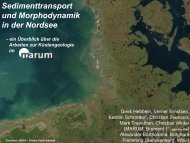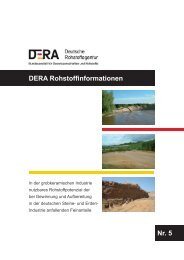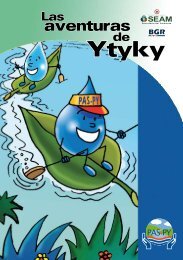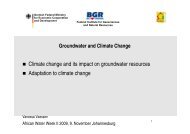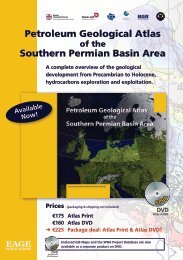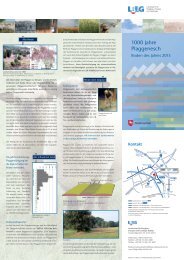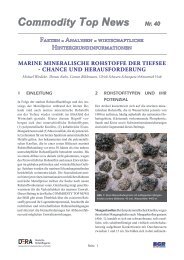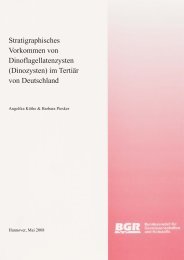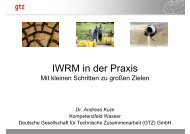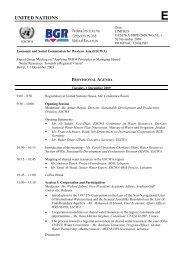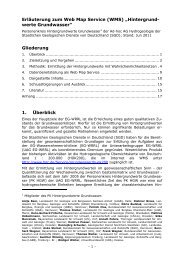Groundwater in the Volta Basin (PDF, 571 KB - BGR
Groundwater in the Volta Basin (PDF, 571 KB - BGR
Groundwater in the Volta Basin (PDF, 571 KB - BGR
Create successful ePaper yourself
Turn your PDF publications into a flip-book with our unique Google optimized e-Paper software.
Table 2 Shared <strong>Groundwater</strong> Bas<strong>in</strong>s<br />
No. of Shared <strong>Groundwater</strong> Bas<strong>in</strong>s<br />
Country<br />
With Riparian Countries With Non-Riparian Countries<br />
Ben<strong>in</strong> 3 2<br />
Burk<strong>in</strong>a Faso 2 2<br />
Cote d’Ivoire 1 -<br />
Ghana 2 1<br />
Mali 2 2<br />
Togo 1 1<br />
4.0 Utilization and Problems<br />
<strong>Groundwater</strong> resources <strong>in</strong> <strong>the</strong> <strong>Volta</strong> bas<strong>in</strong> are used ma<strong>in</strong>ly for domestic water supply <strong>in</strong> both urban and<br />
rural areas. Key cities such as Ouagadougou, Cotonou and Lomé all rely on groundwater for a significant<br />
proportion of <strong>the</strong>ir water supplies. In many rural areas, groundwater is <strong>the</strong> only source of safe portable<br />
water supply. <strong>Groundwater</strong> is also used for water<strong>in</strong>g of livestock and crop irrigation but on a comparatively<br />
limited scale. In general many groundwater sources are untapped although <strong>the</strong> rate of use is rapidly<br />
<strong>in</strong>creas<strong>in</strong>g (ECOWAS-SWAC/OECD, 2006).<br />
The major problems associated with utilization of groundwater <strong>in</strong> <strong>the</strong> <strong>Volta</strong> bas<strong>in</strong> <strong>in</strong>clude:<br />
• Over exploitation as a result of population pressure;<br />
• Contam<strong>in</strong>ation and pollution problems from poor domestic and <strong>in</strong>dustrial waste disposal practices;<br />
• Deforestation and creation of irrigation dams result<strong>in</strong>g <strong>in</strong> reduced aquifer recharge;<br />
• Intrusion of sal<strong>in</strong>e waters and high fluoride and iron concentrations affect<strong>in</strong>g water quality;<br />
• Impacts of reduced ra<strong>in</strong>fall and global climatic change.<br />
5.0 Management of <strong>Groundwater</strong> <strong>in</strong> <strong>the</strong> <strong>Volta</strong> Bas<strong>in</strong><br />
The management of groundwater occurs at different levels <strong>in</strong> <strong>the</strong> various countries. While some countries<br />
<strong>in</strong>clud<strong>in</strong>g Burk<strong>in</strong>a Faso, Cote d’Ivoire and Ben<strong>in</strong> have established systems to monitor shared aquifers,<br />
o<strong>the</strong>rs such as Ghana and Togo do not have such systems <strong>in</strong> place. Monitor<strong>in</strong>g is ma<strong>in</strong>ly by <strong>the</strong> use of<br />
networks of piezometers. However, <strong>in</strong> all cases, <strong>in</strong>stalled monitor<strong>in</strong>g systems are not adequate.<br />
Data and <strong>in</strong>formation are not sufficient to nei<strong>the</strong>r map out <strong>the</strong> aquifers nor assess <strong>the</strong>ir recharge. Also, both<br />
public and private sector <strong>in</strong>stitutions cont<strong>in</strong>ue to operate sectorally, with little coord<strong>in</strong>ation. At <strong>the</strong><br />
transboundary level, <strong>the</strong>re is virtually no contacts or cooperation between <strong>the</strong> various national <strong>in</strong>stitutions<br />
responsible for <strong>the</strong> management of groundwater resources.<br />
Legislation for <strong>the</strong> management of groundwater resources is not common. It usually forms part of general<br />
codes for protection of water resources or <strong>the</strong> environment and is not specific to ground water. However,<br />
efforts are be<strong>in</strong>g made to improve <strong>the</strong> situation as <strong>in</strong> Ghana, which has recently passed ‘Drill<strong>in</strong>g License<br />
and <strong>Groundwater</strong> Development Regulations’ <strong>in</strong> attempt to control drill<strong>in</strong>g and improve data collection.<br />
6.0 Way Forward<br />
Many recommendations exist for improved management of groundwater resources <strong>in</strong> West Africa of which<br />
<strong>the</strong> <strong>Volta</strong> bas<strong>in</strong> is a part. These <strong>in</strong>clude <strong>the</strong> follow<strong>in</strong>g:<br />
Tripoli June 2002 UNESCO/ISARM Workshop on Manag<strong>in</strong>g Shared Aquifers Resources <strong>in</strong> Africa, which<br />
highlighted <strong>the</strong> need to:<br />
• Conduct <strong>in</strong>ventories of African shared aquifers;<br />
• Prepare guidel<strong>in</strong>es for sound and susta<strong>in</strong>able development of shared aquifers;<br />
• Initiate activities with <strong>the</strong> support of partners with<strong>in</strong> <strong>the</strong> framework of ISARM Africa;<br />
2



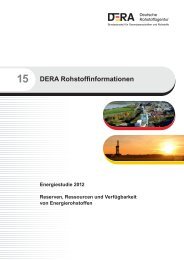

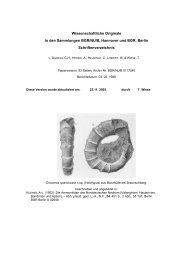
![Tröpfis weltweite Abenteuer [deutsch] (PDF, 6 MB) - BGR - Bund.de](https://img.yumpu.com/13203261/1/184x260/tropfis-weltweite-abenteuer-deutsch-pdf-6-mb-bgr-bundde.jpg?quality=85)
